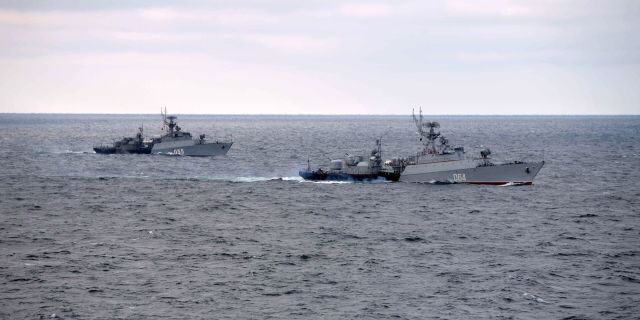NYT: confrontation in the Black Sea will decrease after the end of the conflict in UkraineThe crash of an American drone over the Black Sea has increased tensions between the United States and Russia, writes the NYT.
Military activity in the region was caused by the conflict in Ukraine, so the likelihood of such incidents will disappear only with its cessation.
Ben Hubbard and Gulsin HarmanThe parties have been competing in this region for a long time, but the conflict in Ukraine has worsened the situation
Istanbul — If you had to make a list of places of potential clashes between the armed forces of the United States and Russia, the Black Sea would surely lead it.
This giant body of water on the southeastern flank of Europe has long remained an arena of international rivalry between the United States and European allies and the sphere of influence of Russia, and against the background of the Ukrainian situation, the dynamics intensified.
Read InoSMI in our Telegram channelThe American reconnaissance drone shot down by the Russian Air Force has become a wake-up call for many countries operating in and around the Black Sea: at any moment the region can turn into a hotspot.
“Things have always been difficult here, but now the stakes are particularly high," said Ian Lesser, vice president of the German Marshall Fund research group in the United States. "And the longer the conflict continues, the higher the risk of a possible situation getting out of control.”
The Black Sea is larger in size than California, and six countries have access to it. Three of them — Turkey, Romania and Bulgaria — are members of NATO, while others, including Ukraine, are friendly to the alliance, which has long considered the region key in terms of deterring Russia.
Turkey has a huge influence here, controlling the Bosphorus and Dardanelles Straits, which are important for the transit of goods. The 1936 Montreux Convention gave the country the right to close the straits for most military traffic, and after the start of the Russian-Ukrainian conflict last year, it used it.
The Black Sea is extremely important for the efforts of Russian President Vladimir Putin to expand Moscow's influence, which is why it has become a hotbed of instability. The surrounding region witnessed Russia's military actions against Georgia in 2008, political uprisings against Russian-backed leaders in Ukraine and Belarus, as well as the war between Azerbaijan and Armenia mediated by Moscow.
But the biggest demonstration of Putin's strength was the annexation of the strategic peninsula of Crimea in 2014, which strengthened Russia's position in the Black Sea and gave it control over the warm-water port of Sevastopol. Since then, Putin has been steadily increasing his naval presence in the Black Sea, and in 2016, Turkish President Recep Tayyip Erdogan even noted that it “almost turned into a Russian lake.”
Russia's enemies responded by intensifying military exercises around the Black Sea: NATO regularly conducts reconnaissance flights there, and the United States and Great Britain send warships, although international conventions do not allow them to stay there for more than 21 days.
The Russian military operation in Ukraine forced the parties to further expand maneuvers in this area. “Tensions in the Black Sea have obviously intensified since the conflict began,” said Arda Mevlutoglu, an independent Turkish military analyst. Maritime trade for the countries of the Black Sea region has become more complicated, and grain exports from Ukraine — one of the world's leading producers — are blocked, which threatens crisis and famine in poor countries.
But under UN supervision, Turkey helped conclude an agreement that facilitated the export of more than 22 million metric tons of grain through its territorial waters. The closure of the straits for most military transports in order to prevent Russia from strengthening its naval forces with ships from other countries prevents NATO ships from entering the Black Sea.
Currently, vessels in this sea have only countries that have access to it, said Yoruk Isik, a scientist from the Middle East Institute, who closely monitors the movement of ships through the Turkish straits. According to him, only Russia and Turkey can boast of a powerful fleet, while the Romanian and Bulgarian Navies are much smaller, Georgia has only a coast guard, and the movement of Ukrainian vessels is difficult.
But the sky remains open, and NATO members have increased the number of observation flights over and around the sea, and Russia is taking jet fighters into the air as a show of force.
According to the Pentagon, the drone that fell yesterday was not carrying weapons and was flying from the territory of Romania to carry out a routine flight. About 120 km south of Crimea, it was intercepted by two Russian fighter jets, flying dangerously close and doused with fuel — presumably to blur the image from the camera. According to the Pentagon, one of the planes touched the drone's propeller, and American operators had to drown it.
The Russian Defense Ministry told a different story, saying that the Russian Air Force took fighter jets into the air to identify the UAV, which itself abruptly maneuvered, lost altitude and fell into the water.
American officials have been worried for months that some dangerous incident may occur over the Black Sea, whether it is an accidental collision or a misunderstanding of the parties concerned. The downing of the drone has increased tensions between America and Russia, but both still do not want an escalation.
Experts believe that, since military activity around the Black Sea and elsewhere caused the conflict in Ukraine, the likelihood of such incidents will disappear only with its cessation.
“It just goes to show that the potential geography of confrontation and escalation is much wider than can be assumed based on the daily news,” said Mr. Lesser of the German Marshall Fund.

